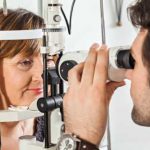 Sudden blurred vision can be a result of numerous health conditions. It can be temporary or chronic, and can get worse over time. Sudden blurred vision is usually not accompanied by pain, but other symptoms such as migraine may be present.
Sudden blurred vision can be a result of numerous health conditions. It can be temporary or chronic, and can get worse over time. Sudden blurred vision is usually not accompanied by pain, but other symptoms such as migraine may be present.
If you’re experiencing blurry vision, objects and people do not appear clearly and sharpness is lost. This condition can affect either one eye or both eyes, depending on the cause. Some people can have blurry vision from birth (in this case, it’s a birth defect) while others develop blurred vision over time.
Advertisement
Sudden blurred vision causes can range in severity, from easily treatable conditions to chronic, life-long complications. Below you will uncover the many different causes of sudden blurred vision along with symptoms and treatment options.
What causes sudden blurred vision?
Myopia (nearsightedness): Due to a refractive error in the eye, distant objects appear blurry. This condition can be treated with corrective lenses or laser eye surgery.Myopia is also known as nearsightedness, occurring when the eyes grow too long from front to back. This causes viewed images to not be properly focused on the retina; the light-sensitive tissue in the back of the eye. Nearsightedness allows for people to view images up close just fine, but will have difficulty viewing images in the distance.
Hyperopia (farsightedness): Close-up objects appear blurry because the eye cannot focus properly. When the object moves further away, it looks clear again. Farsightedness can be corrected with corrective lenses or laser eye surgery.
Astigmatism: Sudden blurred vision appears at all distances as a result of an irregularly shaped cornea due to an imperfection in the curvature of the eye. The light rays do not fall into a single point in the retina, causing sudden blurred vision. Astigmatism is generally considered a treatable condition that often presents at birth and may occur in combination with nearsightedness or farsightedness. Additional symptoms often include eyestrain, headaches, difficulty with night vision, and excessive squinting.
Floaters: More common with aging, floaters can be seen when bits of vitreous fluid float around, casting a shadow in a person’s line of vision. This can sometimes lead to a sudden blurred vision.
Overuse of contact lenses: When contact lenses are used for longer than recommended, it can lead to sudden blurred vision. Ensure you are wearing contact lenses as directed and that you are caring for them properly.
Presbyopia: This is a type of nearsightedness that commonly occurs in people over the age of 40. The lens in the eyes becomes hardened and hence the ability to focus is lost.This results in difficulties view images up close, with the retained ability to see distant objects just fine. This is not to be confused with farsightedness as presbyopia happens when the natural lens in the eye becomes less flexible with age. Farsightedness, on the other hand, is caused by a misshaped eyeball leading to the incorrect focus of light on the retina.
Chronic dry eyes: When the eyes are not well lubricated, sudden blurred vision can result from this condition.Dry eyes commonly occur during instances of poor or inadequate tear production. Having dry eyes often feels uncomfortable, causing your eyes to sting or burn. Developing dry eyes can more commonly occur during certain situations such as on an airplane, in an air-conditioned room, or when viewing a computer screen for many hours on end.
Migraine headaches: Prior to experiencing the migraine itself, sudden blurred vision may occur, accompanied by sensitivity to light and sound and even seeing halos or zig-zags.Experiencing ocular symptoms during a migraine is typically harmless, resolving without medication and within 20 to 30 minutes. These visual disturbances are often called “auras.”
Other health conditions that may cause sudden blurred vision
- Eye conditions and diseases: This may include conditions causing sudden blurry vision in one eye such as having a macular hole. Other eye conditions and diseases that can lead to sudden blurry vision include having a detached retina, eye herpes, or inflammation of the optic nerve (optic neuritis). Some of these conditions may lead to permanent vision loss if not treated
- Cataracts: Lead to blurry or cloudy vision that may progress to complete vision obstruction if not surgically removed.
- Glaucoma: A condition characterized by increased intraocular pressure and can lead to sudden blurry vision. If not treated in a timely fashion, glaucoma can lead to continual vision loss and permanent blindness.
- Age-related macular degeneration: Characterized by a gradual loss and blurring of a person’s vision, typically at advanced ages. Patients may also experience distortions in straight lines appearing wavy.
- Diabetic retinopathy: Seen in diabetic patients with uncontrolled blood glucose levels leading to the development of blurry vision or even vision loss.
- Cardiovascular disease and other systemic diseases: Sudden blurry vision can be a manifestation of conditions like a stroke or a sign of multiple sclerosis.
- Retinal detachment: An emergency situation in which the retina at the back of the eye pulls away from its normal position, possibly leading to sudden blurry vision. Left untreated, retinal detachment can lead to permanent vision loss.
- Retinal vein occlusion: Refers to blockage of a vessel that drains blood from the eye. This can lead to leakage of fluid from the blocked vessel. Because cellular tissue needs a constant supply of oxygenated blood, retinal vein occlusion can lead to eye damage.
- Vitreous hemorrhage: A relatively common cause of acute vision loss that occurs due to the rupture of normal vessels through mechanical force or the hemorrhage of pathological structures.
Sudden blurred vision symptoms
The main symptom of blurred vision is foggy or fuzzy appearance of objects. You may find you have to squint to get a clear view of the object you are looking at. Other symptoms include sensitivity to light, floaters or spots, eye pain, discharge from the eye, loss of peripheral vision, loss of central vision, dry eyes, itchy eyes, increased tear production, poor night vision, red or bloodshot eyes, bleeding from the eye, and poor near vision.
Accompanying symptoms depend on the underlying cause of blurry vision.
Sudden blurred vision treatment options
 There are a few different tests your eye doctor may perform to uncover the root cause of your sudden blurred vision. These tests include:
There are a few different tests your eye doctor may perform to uncover the root cause of your sudden blurred vision. These tests include:
Slit-lamp examination: Your doctor will perform an eye examination with a slit-lamp and ask you to stare at objects. Eye drops to dilate the pupils may also be used.
Refraction test: This test measures your prescription for eyeglasses. Your doctor will have you read letters from a board while switching lenses and checking which lens allows you to see the clearest.
Tonometry: This test measures your eye pressure using a device called a tonometer, which is attached to the slit-lamp. Eye drops are used for anesthetic purposes.
Treatment for sudden blurred vision may be as simple as eyeglasses or contact lens prescription. Speaking of the latter, it’s important to keep your contacts clean, to put them in correctly, and avoid leaving in for longer than advised.
Advertisement
The treatment for sudden blurred vision depends on the cause of the condition. For example, if your sudden blurred vision is a result of uncontrolled diabetes, you will need to take blood sugar under control, either with medications or through natural remedies. Preventing fatigue and tiredness is also important. Make sure you get in adequate sleep and ensure that your eyes do not get dry. Use lubricating eye drops if necessary.
Your doctor will be able to give you more detailed treatment recommendations based on your specific diagnosis.
Having sudden blurred vision may be nothing but a normal phenomenon that quickly resolves on its own, possibly due to eye strain, overexposure to sunlight, or simply being tired. However, if experiencing more pronounced vision changes that include blurriness, double vision, or tunnel vision, it may hint at a more complicated underlying condition that should be evaluated by a medical professional right away.
